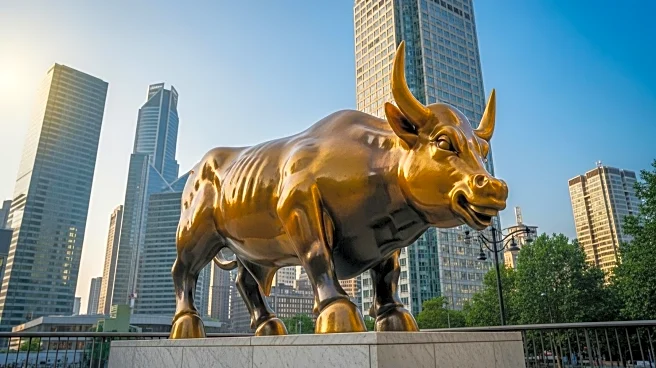What's Happening?
Wall Street is experiencing a surge in stock prices, reaching fresh all-time highs, as the Federal Reserve's prospects for rate cuts improve the outlook for corporate earnings. The market has seen a significant rally, with stocks rising from April lows, amounting to an almost $15 trillion increase. Despite some calls for a temporary pause, bullish sentiment continues to dominate as officials resume easing policy amidst ongoing economic growth. This development sends a positive signal for risk-taking in the financial markets.
Why It's Important?
The Federal Reserve's actions have a profound impact on the U.S. economy and financial markets. By signaling potential rate cuts, the Fed is encouraging investment and spending, which can lead to increased corporate earnings and economic growth. This is particularly significant for investors and businesses, as lower interest rates reduce borrowing costs and can stimulate expansion. The rally in stock prices reflects confidence in the economic outlook, potentially benefiting sectors such as technology, finance, and consumer goods. However, it also raises questions about the sustainability of such growth and the potential for inflationary pressures.
What's Next?
As the Federal Reserve continues to monitor economic indicators, further decisions on interest rates are anticipated. Investors and businesses will be closely watching for any changes in policy that could affect market dynamics. Additionally, the ongoing economic growth and stock market performance may prompt discussions among policymakers regarding the balance between stimulating the economy and managing inflation risks. Stakeholders, including financial institutions and corporate leaders, will need to adapt their strategies in response to these developments.
Beyond the Headlines
The Federal Reserve's policy decisions have broader implications beyond immediate market reactions. They influence consumer confidence, employment rates, and overall economic stability. The potential for rate cuts may also affect international markets, as global investors react to changes in U.S. monetary policy. Furthermore, the focus on risk-taking and investment could lead to increased scrutiny of corporate governance and financial practices, as stakeholders seek to ensure sustainable growth.










